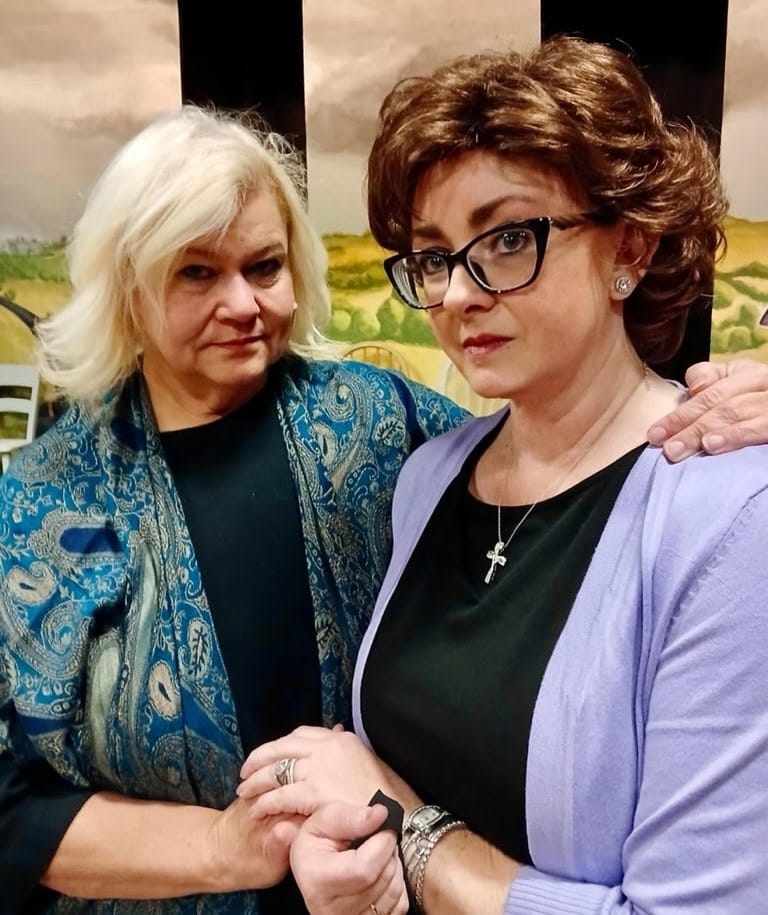Small-town subversion: 'Book of Days' at Wichita Community Theatre
The College Hill theater delivers a strong production of Lanford Wilson’s powerful play, on stage through Sunday.

“Book of Days” by Lanford Wilson runs through this weekend in a beautifully staged production at Wichita Community Theatre. Wilson, a Missouri native, frequently writes about religious hypocrisy in Anytown, U.S.A., his complicated characters simultaneously sanctimonious and vulnerable. His plays are manna for actors, and “Book of Days” is no exception, offering its dozen cast members solo spotlights in which to perform directly in front of the audience in the manner and tone of “Our Town.” (“We’re going back a couple of years,” one actor says following the opening scene. “We’re going back to last night,” another says near the end, “and then we’ll say good night.”)
The story is set in 1999 Dublin, Missouri, a fictional town of 4,000-plus souls containing, among the usual small-town standbys, a cheese plant, a community theater, and a fundamentalist church. As is often the case in such communities, its families — the Hochs and the Bateses — are intertwined with mixed allegiances. Ruth Hoch (Ashley McCracken-Christy) is the bookkeeper at Walt Bates’ cheese factory; she’s also a good singer who auditions for G. B. Shaw’s “St. Joan” at the community theater in the belief that it’s a musical. For her audition with Boyd Middleton (Justin Noel Hall), a hotshot director brought in from Los Angeles, she recites the only non-musical monologue she knows, from the balcony scene in her high school production of “Romeo and Juliet.” Middleton’s groans (and ours) morph into appreciation for her strong delivery. As with Joan of Arc, one underestimates Ruth at one’s peril.
Also employed at the factory is Ruth’s affable husband Len (Chris Welborn), a gourmet cook with a passion for artisanal cheeses. Walt is content pumping out his bland product for Kraft Foods, but after pestering, Len convinces him to let him develop a small percentage of fine cheeses that, with time, will reap higher profits. The unraveling of that plan is an element in the storyline.

Walt, a tolerable boor, is the richest man in town. His beautiful wife Sharon (Jami Thomas) has coiffed and Miss Mannered herself into exactly the role she believes fitting for her place among the town’s prominent citizens. (“I am thankful I was pretty for him,” she says at one point.) His only disappointment is his son, James Bates (Jake Steward), a ne’er do well with political ambitions whom Walt had hoped would carry on the family business. Smarmy and smug, James freely flirts and openly cheats on his wife Louanne (Chelsea Daniel). James is far from the only misogynist: Indeed, the play is draped in rampant sexism, with Len Hoch the only man free of it.
As rehearsals progress, Ruth’s character research stirs up profound personal questions about justice, authority figures, and the confounding qualities of the girl warrior herself. She begins to become Joan — not as a Method actor but in a deep, lasting way.
Also prominent in the story is the Rev. Bobby Groves (Christopher Paul Martin), who keeps a strongman’s hold over his congregation. He also keeps a tight grip on the town his church serves — or, more accurately, the town that serves his church. Groves possesses all the elements of Christian hypocrisy, and he is such, formidably. But he’s a complicated man, well-read, self-aware, and in some ways decent. (He and Ruth discuss at length the writings of Shaw in general and of “St. Joan” in particular.)
The plot is driven by an unexpected death, allegedly a hunting accident but suspect to Ruth, who says “something’s not right.” Pulling threads on that something is what eventually leads to the play’s conclusion.
Sign up for the Weekly SHOUT, our free email newsletter
Stay in the know about Wichita's arts and culture scene with our event calendar and news roundup.
No spam. Unsubscribe anytime.
Steve Miotto’s directorial hand is evident in the tight ensemble work. He has honed each actor to be part of the whole, teasing stronger performances out of those less stellar and fine-tuning the most seasoned: No one stands out. All 12 players come across as people who have lived together for a long time, who know each other for better or worse, who judge and lie and love.
One example: Ruth’s mother-in-law Martha Hoch (Deb Goin) is the town’s wild woman. Outfitted in flowing garb and sandals, regularly pissing off the administration of the private Christian school where she teaches English, she’s a feisty holdout from the Woodstock generation and happy to flaunt it. In one of many memorable scenes, she comforts uptight socialite Sharon, whose legs are perennially so close together a crowbar couldn’t part them. It’s a tender moment among these unlikely friends, and then Sharon stands and says, “Martha, I’ll never understand the way you talk.”
Daniel, Welborn, and Abigail Luchsinger — who plays pretty, petite Ginger Reed, previously dallied with by the cad James and currently in lust with director Boyd, and smarter than men think she is — help narrate the town’s story with standout performances. In one searing scene, Sharon is in such denial about how a trauma has shattered her life that she refuses to enact her response to it. Reed steps in and ferociously enacts it for her while Sharon watches herself, horrified.
Hall is also strong as the director whose motives for coming to town unfold but whose charm shines through his flaws. He’s the outsider observing these people alongside the audience, and the experience changes him as it does us. Martin, Todd Reifschneider (as Sheriff Conroy Atkins), and Steward, whose villain James keeps his vulnerability hidden, also put in solid performances.
Goin and Thomas craft layered women in roles that might have been stereotypical if somebody other than Wilson were writing them. Andrew T. Johnson is on fire as Earl Hill, a volatile employee of the cheese plant whose unfortunate combination of ambition and stupidity spell his downfall. He delivers a knockout monologue describing a horrific tornado — mighty close to viscerally experiencing one, at least for this viewer — and the depth and meaning of his intense passion in that monologue become clear in his subsequent, heart-rending scenes.

At the play’s and the production’s center is McCracken-Christy, crisp and heartfelt in an assured delivery of the one character still asking questions, still seeking truth, still true to her own self. She embodies both the character’s pride and humility and, as a performer, exploits both the rich comic material and the depth of the drama.
Miotto’s set features a beautiful backdrop painted by Hanson Long primarily in pale blue and brown, which flows past its “frame” — entrance ways interrupted by black curtains — to leak over and beyond doorways at right and left. Costumes are pitch perfect (at different times, Len and Ruth wear T-shirts sporting the cheese factory’s name and logo; during tech week, Joan carries a warrior’s chain-mail vest). Props, the subtle lighting, and the sound design are effective (the pre-show music is lovely).
The Details
Wichita Community Theatre presents “Book of Days”
March 20–23, 2025, at Wichita Community Theatre, 258 N. Fountain St. in Wichita
Performances take place at 8 p.m. Thursday–Saturday and 2 p.m. Sunday. The show runs 2 hours and 45 minutes with a 15-minute intermission.
Tickets are $18; discounts are available. Call 316-686-1282 for reservations.
Learn more about "Book of Days" at Wichita Community Theatre.
Anne Welsbacher writes plays, nonfiction, and book and theater reviews. She is the Performing Arts Editor for this publication. awelsbacher.com
⊛ Off-Broadway, a Kansas playwright meditates on the labor that defines us
⊛ Wayne Gottstine is 'back in the fight'
⊛ Star of MTW's 'Gypsy' finds purpose both on stage and from behind a pulpit
⊛ 'You don't have to give up': Clark Britton on making art into his 90s
⊛ Bygone Friends University museum housed curious collections
The latest from the SHOUT
 The SHOUTAnna Andersen
The SHOUTAnna Andersen
 The SHOUTEmily Christensen
The SHOUTEmily Christensen
 The SHOUTSam Jack
The SHOUTSam Jack
 The SHOUTTeri Mott
The SHOUTTeri Mott
